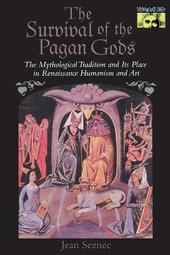
|
The Survival of the Pagan Gods: The Mythological Tradition and Its Place in Renaissance Humanism and Art
Paperback / softback
Main Details
| Title |
The Survival of the Pagan Gods: The Mythological Tradition and Its Place in Renaissance Humanism and Art
|
| Authors and Contributors |
By (author) Jean Seznec
|
|
Translated by Barbara F. Sessions
|
| Series | Mythos: The Princeton/Bollingen Series in World Mythology |
|---|
| Physical Properties |
| Format:Paperback / softback | | Pages:392 | | Dimensions(mm): Height 254,Width 197 |
|
| Category/Genre | Renaissance art
Humanist and secular alternatives to religion |
|---|
| ISBN/Barcode |
9780691029887
|
| Classifications | Dewey:291.1300924 |
|---|
| Audience | | Professional & Vocational | | Tertiary Education (US: College) | |
|---|
| Illustrations |
108 illus
|
|
Publishing Details |
| Publisher |
Princeton University Press
|
| Imprint |
Princeton University Press
|
| Publication Date |
21 January 1953 |
| Publication Country |
United States
|
Description
The gods of Olympus died with the advent of Christianity--or so we have been taught to believe. But how are we to account for their tremendous popularity during the Renaissance? This illustrated book, now reprinted in a new, larger paperback format, offers the general reader first a discussion of mythology in late antiquity and the Middle Ages, and then a multifaceted look at the far-reaching role played by mythology in Renaissance intellectual and emotional life.
Author Biography
Jean Seznec was for many years a member of the faculty at Harvard University, and up until his death in 1983 he taught at All Souls College, Oxford, England.
Reviews"Such a synthesis has never been attempted before, and the author ... has performed this much-needed service with exceptional distinction and clarity of purpose."--Art Digest "Here is a book ... that tells us what became of the gods after the fall of Rome, in what strange disguises they lived on, and how they emerged in the Quattrocento with odd attributes and symbols the ancients never knew... It is a formidable task, demanding vast learning in many fields; and it is brilliantly performed."--The Times Literary Supplement
|